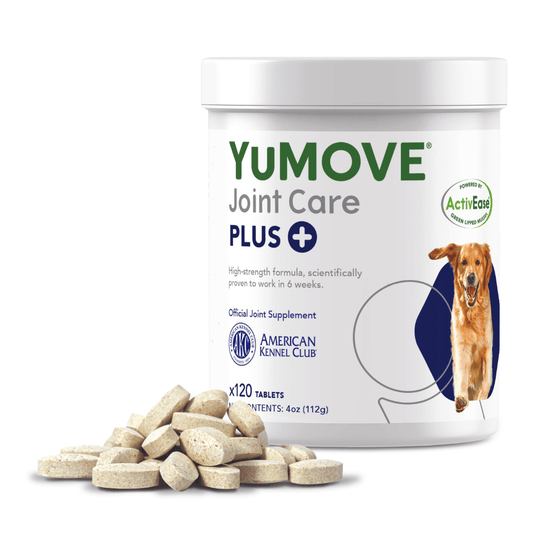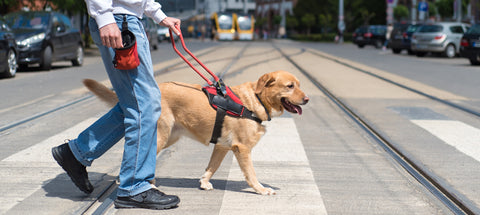At YuMOVE, we understand that your dog is part of the family – a furry loved one. We also know how heartbreaking it can be to learn that your special pup has joint stiffness.
You probably know that stiff joints is generally more common in older dogs. But did you know that some breeds are more likely to experience joint stiffness because of their genes and body shape? If you have one of those breeds, you'll want to watch your dog a little more closely for early signs. Let's dive into this a bit more…
Top tips for spotting joint stiffness in dogs
It can be tricky to notice when your dog is experiencing joint stiffness because dogs often hide how they’re feeling. They can very tolerant, and don't always show that something's wrong until it's really bothering them. Stiffness usually happens in the shoulders, hips, elbows, and knees. Here's what you might want to watch for in your dog:
- Sleeping more or reluctance to get off their bed
- Excessively licking joints
- Lagging behind on walks
- Lethargy
- A generally low mood
- Grumpiness and sensitivity when being touched or stroked
- Appearing more stiff when they get up after a nap
Labradors
Labrador Retrievers are known for being playful their whole lives, and that's part of why we love them. But their family history combined with their always-on-the-go nature and their big size can make them more prone to joint stiffness.

What’s more, Labradors often have a tendency to gain weight, and those extra pounds can put added pressure on your dog's joints. This can exacerbate any joint stiffness. So keeping an eye on your Lab's weight could help keep their joints healthy.
Dachshunds
Dachshunds, with their long bodies and short legs, are more likely to experience occasional joint stiffness in their knees, hips and back. This risk goes up if your little sausage dog has gained some extra weight.

Even if your Dachshund is slim, those short legs work hard – that's why it's a good idea to be careful about letting your Dachshund jump up too much. Too much jumping could lead to joint stiffness.
German Shepherds
German Shepherds are large, smart and strong dogs, known for being great workers. But their larger size means they can sometimes experience stiff joints. Just like many purebred dogs, German Shepherds can be more likely to have joint stiffness because of their genes. It's just something to keep an eye on if you have one of these amazing dogs.
Corgis
Corgis are known for their distinct short legs and long bodies, features that make them unique and charming. However, this very structure that defines their appearance also makes them more prone to occasional joint stiffness. Their long spinal column can put added stress on their back and hip joints, and their short legs may have to work harder to support the rest of their body. Corgi owners should be mindful of the fact they’re more prone to joint stiffness, and take measures such as maintaining a healthy weight and providing appropriate exercise to help keep their beloved pets' joints healthy.
Pugs
Pugs are adorable for their easy-going natures, but their short and thick build can sometimes lead to occasional joint stiffness. If you've got a Pug, it's a good idea to go for regular shorter walks and give them lots of toys that make them think. That way, you can keep them happy and healthy without putting too much strain on their little bodies.
Golden Retrievers
Golden Retrievers are popular for a reason, with their friendly demeanor, beautiful golden coats, and unwavering loyalty. But, bear in mind that due to the fact they can put on weight pretty easily, it’s important to keep your Goldie active and healthy.

If you have a Golden Retriever, they'll most likely be happiest with a couple of hours of exercise every day. That can be walks, swimming, or just playing around. And don't forget fetch – they love it, and it's even part of their name! Keeping them active, while avoiding too much high-impact exercise, will help them stay fit and their joints healthy.
Rottweilers
Rottweilers are strong, muscular dogs that love to stay active. Because of their powerful build, they might be more likely to experience joint stiffness. It's just something to keep in mind if you have a Rottweiler, so you can make sure they stay comfortable and happy.
St. Bernards
St. Bernards are gentle giants that aren't big fans of exercise, but their huge size is something to think about. That extra weight can be tough on their joints, especially as they grow older. So if you have a St. Bernard, just keep an eye on them and monitor their health as they head into their twilight years.
What to do if your dog is on this list
Joint stiffness can't be fixed completely, but don't worry, there are ways to ease stiff joints and keep your dog moving. If you want to help support your dog's joint health, we recommend starting joint supplements early. YuMOVE Joint Care is based on over 15 years of scientific research. Made with high-quality ingredients, our range of supplements are scientifically proven to make a difference in just 6 weeks.*
What to do if you’re an aspiring pet parent
Knowing which dog breeds are prone to stiff joints can help you pick the perfect pup for you and your family. If you're thinking about getting a new furry friend, it's a good idea to ask if the parents or any of their offspring have ever experienced joint stiffness. That way, you can make sure you choose a dog that fits well with your family's lifestyle.
How to support your dog during key life stages
If you've got a furry family member and you're wondering how to help support their joint health, have a chat with your veterinarian. They can tell you about exercises to keep your pup moving and what activities might be best to avoid.

And don't forget, joint supplements aren't just for older dogs with stiff joints. Dogs at all life stages can benefit from a little extra support for their joints. Here's how you can help support your dog's joints:
Younger dogs
When your younger dog is always ready to play, it's a joy to watch, but you'll also want to think about keeping those little joints happy:
- Introduce them to a joint supplement formulated specifically for younger dogs
- Be mindful of too much exercise. Younger dogs are having so much fun they might not know when to take a break! Particularly avoid too much high-impact exercise.
Adult dogs
As your dog passes their younger years, you might find yourself with a mischievous adult pup on your hands. This is a great time to think about a joint supplement, and here's why – that lively behavior is just their way of burning off energy, but all that jumping and running can be tough on bones and joints. A joint supplement can help support joint health in active dogs.
Older dogs
As our dogs get older, they may well start to slow down a bit. Here are some ways you can take good care of your senior dog:
- If you notice your furry friend sleeping more, slowing down on walks, or having a hard time with stairs, don't hesitate to talk to your veterinarian
- Consider adding a joint supplement to their meals. Look for one that's specially designed for older dogs, and you might be amazed at the difference it can make! It's just one way you can help support the health of your golden oldie.
Want to find out more about keeping your dog happy and healthy? Check out our blog for helpful articles and plenty of information on how to support your pup at key life stages.
















